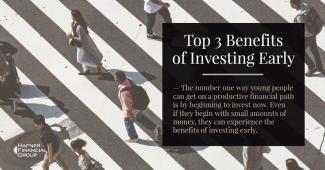
Top 3 Benefits of Investing Early
When you are young, time is on your side. But as you grow older, it becomes more precious and you can't get lost time back.
Many Baby Boomers are wishing they had some time back. They would have made different financial decisions. Or so they think anyway.
Millennials have time on their side but they also have the recent experience of the Great Recession. They may be afraid of the markets.
This reminds me of my grandparent's generation.
Coming of age in the Depression marked them for life. That generation never again trusted the markets. They were extremely suspicious of investments for their entire lives. This was to their detriment. They lived much smaller financial lives than they had to.
But the world is different today. There is so much more knowledge and information available. It seems to me that even though the Millennial Generation came of age in a tough financial environment similar way to their great grandparents, they have an opportunity to overcome this challenge.
The number one way young people can get on a productive financial path is by beginning to invest now. Even if they begin with small amounts of money, they can experience the benefits of investing early. And these benefits are powerful.

1. Power of the financial markets
One of the greatest benefits of investing early is that you will put the enormous power of the financial markets on your side for a longer period of time.
Just how powerful are these market forces?
Over the last 14 years, Some of the best performing investments were Small Company US stocks which averaged 8.5%, High Yields Bonds averaged 9.2%, and Emerging market stocks averaged 9.8%. Please see the attached JP Morgan Chart.
Keep in mind that Small Company Stocks may be subject to a higher degree of risk than more established companies' securities. The illiquidity of the Small Cap market may adversely affect the value of these investments. High yield/junk bonds (grade BB or below) are not investment grade securities, and are subject to higher interest rate, credit, and liquidity risks than those graded BBB and above. They generally should be part of a diversified portfolio for sophisticated investors. International investing involves special risks not present with U.S. investments due to factors such as increased volatility, currency fluctuation, and differences in auditing and other financial standards. These risks can be accentuated in emerging markets.
Now it's pretty unlikely that you are only going to have the top performing sectors in your investment portfolio. But according to J.P. Morgan, a diversified portfolio would have averaged 6.9% over that same period.
Keep in mind that these returns include the poor performance of the Great Recession. Other than investing, where else could you find returns like those?
2. Dollar cost averaging
Another benefit of investing early is that you can put the power of Dollar Cost Averaging to work for you. When you employ this technique, you could possibly get better returns on your overall portfolio than the individual investments in your portfolio.
How is this possible?
When you dollar cost average, you buy a fixed dollar amount of a particular investment on a regular schedule, regardless of the share price. By doing this you purchase more shares when prices are low and fewer shares when prices are high.
The result is that when the market is down, which most people consider bad, we reap a benefit. We get more shares for our money. We actually accumulate more shares when the market is down and less when it's up. And isn't that exactly what a smart investor would want to do?
So, another benefit of investing early is that you are going to get greater returns for a longer period of time.
Periodic investment plans do not assure a profit or protect against a loss in a declining market. Such plans involve continuous investment in securities regardless of fluctuating price levels.

3. The Power of Compounding
In the words of Vanguard , This is a snowball effect that happens when your earnings generate even more earnings. You receive interest not only on your original investments, but also on any interest, dividends, and capital gains that accumulate—so your money can grow faster and faster as the years roll on.
Take a look at this. If you are 25 now and you invested $300/month for the next 10 years, and you could get an 6% return on your investments, you could have $48,544 by the time you were 35.
If you then increased your investing from $300 to $600/month for another 10 years, your nest egg could grow to $183,451.
Do you see how your money is growing exponentially? That is because your principal is growing as well as the new money you are adding to your investments.
If you increased your savings again from $600 to $1,200/month for another 10 years, you could have $526,438 by the time you were 55.
And if you increased it again from $1,200 to $2,000/month for an additional 10 years, you could have over one million dollars by the time you are 65.
Save | $300/month | Age 25 to 35 | $ 48,554 |
$600/month | Age 35 to 45 | $ 183,451 | |
$1,200/month | Age 45 to 55 | $ 526,438 | |
$2,000/month | Age 55 to 65 | $ 1,249,157 |
Assuming a return of 6% and an expense ratio of 23%
Of course, if you didn't start until you were 35, things would be very different. You would lose 10 years of saving and investing and you wouldn't be anywhere near a million dollars at age 65. You would have cheated yourself out of over $700,000!
Keep in mind, investing involves risks including the potential loss of principal.
Theodore Roosevelt famously said to "do what you can, where you are with what you've got."
Young or old, this is good advice for all of us. After all, you will never be younger than you are today.
I hope you will act now and put the powerful forces of the financial markets to work for you. This way you'll have the best chance of receiving the benefits of investing early.
This article was quoted by the Washington Post in Michelle Singletary's article " Invest for retirement or save for college? What your child should do with summer earnings. "
Investing in the Stock Market involves risks. Past performance is not indicative of future results. Speak to your financial advisor about your specific situation.

